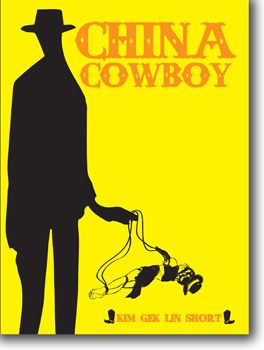At the
most rudimentary level, Kim Gek Lin Short's China Cowboy
(Tarpaulin Sky Press, 2012)
tells the story of a depraved relationship between La La and Ren, with Short building her nonlinear narrative through a series of
fragmented prose poems that alternate between the years 1989 and
1997. The story's premise focuses on Ren, an American from Missouri, who kidnaps La La, a twelve year old Chinese girl from Hong Kong, and
sexually assaults her over the course of eight years.
But
outside of the obvious themes of sexual abuse and criminal behavior,
China Cowboy offers an
interesting exploration of identity formation in an era of global
capitalism. In one of the first prose blocks, the collection's
narrator informs readers that “La La always wanted to be a cowgirl”
(5), a desire fueled by a childhood set to the soundtrack of American
country music:
La La liked to listen to music music all day she played her records.
Loretta Lynn Patsy Cline Emmylou Harris beautiful cowgirls. La La
never asked for anything but one day she asked for a guitar. Her
mother was hanging laundry out the kitchen window. Her mother blared
COWGIRLS DON'T HAVE FLAT FACES gave her daughter a clothespin. La La
put it on her nose. Wore it to school. Wore it to bed. Did not take
it off even dyeing her hair. (5)
La La idolizes
Lynn, Cline, and Harris, but her mother chides both this infatuation
and request for a guitar as ridiculous due to her “FLAT FACE.”
According to La La's mother, physical appearance dictates identity
and, therefore, is to a great extent immutable. Undaunted, La La
wears a closespin on her nose, risking pain and public humiliation in order to change her facial features and realize her dream of
becoming a American cowgirl singer.
But it's not just
her facial features that La La seeks to alter. The narrator also
mentions how, when she was “five or six,” La La sang “in her
corner of the bigger room practicing losing her accent” (49). It
would appear that her presistence pays off; in the prose poem “Fist
City,” the La La of 1997 has successfully transformed her vocal
patterns:
Y'all, where I come from there are no maps to it, and what y'all
don't know I trick it up. I had experience before I even met Ren, and
some of it weren't girls...Ya'll, I would've been out of your league
at 12. I'm only tattlin' now. (17)
Employing the
Southern-inflected “y'all” and “tattlin,” La La not only
loses her accent, but tailors her new voice to a particular region of the
United States in order to sound more like a cowgirl. Of course, by
erasing a past and replacing it with one that never existed, La La
must now admit that “where I come from there are no maps to it.”
Just because La La
can't map where she comes from, though, doesn't mean she can't
imagine an origin. While living in captivity, La La:
hears synthesized theme music from The Good, The Bad and The Ugly
and sometimes sees Clint Eastwood poncho-ed and posing in the
doorframe of the bathroom...From the look on Clint's face she know
they are thinking the same thing. She thinks, it is like they are the
same person. She thinks, it is like he is my blood father. (46)
In La La's
imagination, Clint Eastwood's character Blondie from the 1966
Spaghetti Western The Good, The Bad and The Ugly,literally,
becomes her biological father. On the one hand, the construction of
an originary tale based upon a movie starring an American celebrity,
no doubt, speaks to the all-consuming nature of American
entertainment and its hegemonic grip on global culture; on the other
hand, Sergio Leone, an Italian director, filmed the movie in Spain
primarily using European and Mexican actors. The American-self La La
constructs, in fact, is a transnational product from the beginning:
a European facsimile of an American Wild West that, itself, never
existed: imagination layered in imagination covering a forgotten
past.
La La, eventually,
questions the authenticity of Patsy Cline and the American life she
imagined. Before her kidnapping, she thinks:
When I get to America I will have my own room children in American
have their own rooms. It will have a lock on the door like when I'm
famous and have curled hair. When I get to America I can be anything
I can be Patsy Cline I have her wrists. (18)
After
Ren kidnaps her, though, her dream of a private room with a lock,
fame, and curled hair vanishes. La La can only wonder at “why the
white devil wants to hump so much” (13). First-hand experience
allows her to see through the smoke, mirrors, and movie sets of the
American Dream, revealing instead a “white devil” who “humps so
much” and leaves her covered in “semen loose warm stream dewlap
my hair saltwhite smeared” (28). In this depraved confusion, La La
turns to song in order to question how that dream and her imagined American identity managed to fail her: “Why
can't Batman play the guitar? / … / Why can't Elvis fly a
spaceship” (101)?


No comments:
Post a Comment